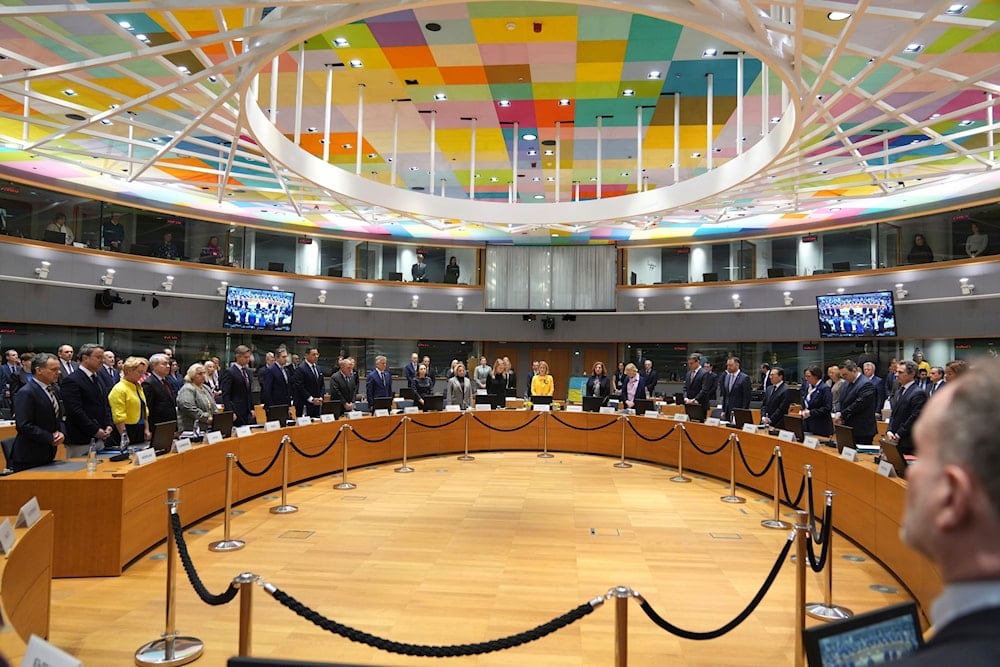European Union lifts sanctions on key economic sectors in Syria
The Council of the European Union announced that the sanction lift will include the oil, transport, and financial sectors in a bid to support the "political transition in Syria."
-

European Union foreign ministers stand for a minute of silence during a meeting of EU foreign ministers at the European Council building in Brussels, on Monday, Feb. 24, 2025 (AP)
The European Council of the European Union said today it suspended a number of restrictive measures over the situation in Syria, adding that the decision comes as part of the EU's "efforts to support an inclusive political transition in Syria, and its swift economic recovery, reconstruction, and stabilization."
The press release published on Monday adds that the EU "aims to facilitate engagement with Syria, its people, and businesses, in key areas of energy and transport, as well as to facilitate financial and banking transactions associated with such sectors and those needed for humanitarian and reconstruction purposes."
The EU Council will suspend sanctions in the transport sector and energy sector, namely oil, gas, and electricity, in addition to removing five entities (Industrial Bank, Popular Credit Bank, Saving Bank, Agricultural Cooperative Bank, and Syrian Arab Airlines) from the list of those subject to a freeze in funds and economic assets.
It will also allow "making funds and economic resources available to the Syrian Central Bank" and introduce exceptions to the ban on establishing banking relationships between Syrian banks and financial institutions within member state territories, permitting transactions related to the energy and transport sectors, as well as those necessary for humanitarian and reconstruction purposes.
The council added that it will "extend indefinitely the application of the existing humanitarian exemption" and "introduce an exemption for personal use to export prohibitions of luxury goods to Syria."
The announcement goes on to highlight that any sanctions placed on the al-Assad regime will be sustained, including in the "chemical weapons sector" and "illicit drug trade", not to mention the restrictive measures on the arms trade, dual-use goods, equipment for internal repression, software for interception and surveillance, and the import/export of Syrian cultural heritage goods.
It concludes by saying that "EU restrictive measures have been used as a tool against the Al-Assad regime" and that "the EU stands with the Syrian people in this moment of transition."
Syria, EU, discuss lifting sanctions
The Syrian Finance Minister Mohammed Abazeed held discussions with European Union officials on January 29 regarding Syria's financial position and the possibility of lightening sanctions, making it the first meeting of its kind since the HTS ousted al-Assad's regime.
The Syrian finance minister discussed this with Germany's temporary envoy to Syria Bjorn Gehrmann and EU representative Michael Ohnmacht, days after the EU designed a roadmap to gradually lift sanctions from Syria.
Previously, the European Union imposed a wide variety of sanctions including a ban on oil exports and restrictions on international financial channels, as well as an arms embargo and travel bans on Syrian officials, and limits on state-run businesses.
Six EU nations advocated for the lifting of sanctions on January 13 in a document endorsed by Germany, France, the Netherlands, Spain, Finland, and Denmark, stating that the EU "should immediately begin adjusting our sanctions regime."
Turkiye expressed its optimism that the European Union will lift its sanctions on the Syrian according to Turkish Foreign Minister Hakan Fidan who added that Turkiye has established a coordination mechanism to provide immediate aid in crucial sectors such as transportation, energy, and healthcare.

 3 Min Read
3 Min Read










